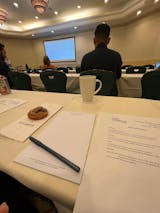Conference material was educational and up to date. Speakers were engaging and knowledgeable. Lots of time for fun activities. Had a great time with a few of the other conference goers on a boat ride, highly recommend. The waterpark is fun for all ages and beach is beautiful!
This was an excellent CME course — well-organized, engaging, and packed with relevant, up-to-date content, that could be applied to my day to day practice . The presenters were experienced clinicians who shared valuable insights on complex cases, diagnostic reasoning, and management strategies. Many high-yield outpatient topics were covered on their agenda. Whether you’re early in your medicine career or a seasoned clinician looking to stay current, I can’t recommend this course enough. It’s an excellent investment of time, and I walked away with practical tools and renewed confidence in my clinical decision-making. The CME being in the beautiful Atlantis resort in the Bahamas was the cherry on top!
This has been a great collection of clinical pearls and reference to original articles! I'll be back - highly valued experience overall!
The conference was excellent. I learned a lot. Thank you very much
This was my first conference with CME vacations. It was a great experience. Speakers were very knowledgeable and up to date. Excellent review of studies with practical applications. Would definitely choose this company again!
Very interesting topics in a wonderfull place in Hotel Atlantis Bahamas. It’s very well organized with the sessions in the morning, so you can enjoy the rest of your day at the pool or at the beach…
Don’t hesitate !
The speakers provided concise up-to-date information, and the location was amazing. I will definitely attend another CME Vacations conference.
My husband and I had a great time in the Bahamas! The CME course was perfectly placed in the morning with plenty of time to enjoy the outdoors here in the Bahamas. The speakers shared many updates and studies to help guide my practice. They were excellent at answering questions and were personable and shared their own experiences. I would recommend this conference to my peers and would certainly come back again.
It is one of the best conferences , very up to date information.
CME was great, very accommodating and very informative.



